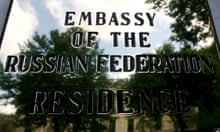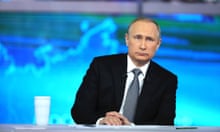Nato must begin to compete on the cyber-battlefield to counter Russian hacking, which is “weaponising misinformation” to create a post-truth age, the defence secretary, Sir Michael Fallon, has said.
In his hardest-hitting comments yet about Russia, Fallon said that in the past two years it had targeted the US, France, Germany, the Netherlands, Bulgaria and Montenegro, which becomes a full Nato member this year. He blamed Russia for helping create the fake information age.
“Today we see a country that, in weaponising misinformation, has created what we might now see as the post-truth age. Part of that is the use of cyber-weaponry to disrupt critical infrastructure and disable democratic machinery,” he said.
His rhetoric contrasts with that of Donald Trump, who appears to be moving towards rapprochement with Moscow and has described Nato as obsolete.
In a speech on Thursday night at St Andrews University, Fallon said there had been a step-change by Moscow last year that brought a rise in cyber-attacks. “Russia is clearly testing Nato and the west. It is seeking to expand its sphere of influence, destabilise countries, and weaken the alliance. It is undermining national security for many allies and the international rules-based system. Therefore, it is in our interest and Europe’s to keep Nato strong and to deter and dissuade Russia from this course.”
He added: “President Trump has spoken about the need for engagement with Russia. He’s right. Great nations like the US and Russia will talk. Indeed, they must talk to preserve the rules-based information system underpinning our security and prosperity. The UK too needs to engage with Russia, including military to military. Yet President Trump is a realist. He knows engagement is an equation of risk versus reward, with the outcome decided by a nation’s deeds, not its words.”
There were areas where the west did cooperate with Russia, Fallon conceded. But he went on: “Above all, we must not accept as any kind of new normal Russia’s propaganda, whether overt or covert, its easy disregard for hard facts and numbers, or its blatant distortions and evasions.”
Fallon said Russia, having opted to become a strategic competitor to the west, could not expect business as usual. “Part of our response is for Nato and the west to do more to tackle the false reality promoted through Soviet-style misinformation. Whatever else we do on deterrence and dialogue, we must counter Putin’s Pravda with faster truth … We need to call out messengers such as RT [the Russia Today television channel].”
Although Fallon portrayed the Kremlin as the aggressor in terms of hacking, America’s National Security Agency and Britain’s GCHQ hack targets in Russia on a regular basis.
Fallon insisted Trump was “100% backing Nato”, as Theresa May said after meeting the US president in Washington, and that his grievance was over the failure of most Nato members to contribute more towards defence costs.
In a speech a fortnight ago, the chairman of the Commons defence committee, the Conservative MP Julian Lewis, was less sanguine than Fallon and described Trump’s comments that the US might abandon Nato as “radical and reckless”.
Fallon also accused the Russian government of routinely lying. “There is a special Russian word for this. Not maskirovka, the old deception perpetrated by its intelligence agencies, but vranyo, where the listener knows the speaker is lying and the speaker knows the listener knows he is lying but keeps lying anyway.”
There is no certainty among senior officials at the Ministry of Defence and elsewhere around Europe that Trump is indeed 100% behind Nato. They are waiting for a visit by the new US defence secretary, James Mattis, in a fortnight to the Nato headquarters and the Munich security council in the hope of clarification.
Previous US presidents and defence secretaries have repeatedly called on Nato members to raise defence spending to at least 2% of GDP but, unlike Trump, they have always combined it with assurances that Nato forms the bedrock of US and west European defence policy.
Fallon said that 19 of Nato’s 28 members did not even spend 1.5% on defence. Only five members meet the 2% rule, including Britain, albeit through creative accounting. “So President Trump is right to challenge Nato to raise its game,” Fallon said. “That means not five but all members meeting the 2% commitment. It means supporting reform to make Nato more agile, resilient and better configured to operate in the contemporary environment including against hybrid and cyber-attacks.”
As Fallon was preparing to deliver his speech, which praised the imposition of US and European sanctions on Russia, the US Treasury announced it was adjusting sanctions imposed last year by President Obama on the Russian intelligence agency, the FSB.
A report by the Commons public accounts committee today says a skills shortage is undermining confidence in the government’s ability to protect Britain from high-level cyber-attacks. Ministers have taken too long to consolidate the “alphabet soup” of agencies tasked with protecting the country, the public accounts committee said. The role of the Cabinet Office, responsible for coordinating information protection across the government, remained unclear.
Meg Hillier, the committee chair, said the “government … approach to handling personal data breaches has been chaotic and does not inspire confidence in its ability to take swift, coordinated and effective action in the face of higher-threat attacks.
“The threat of cybercrime is ever growing, yet evidence shows Britain ranks below Brazil, South Africa and China in keeping phones and laptops secure. In this context it should concern us all that the government is struggling to ensure its security profession has the skills it needs.”











Comments (…)
Sign in or create your Guardian account to join the discussion